
Along in 1965 came a new member called Syd Barrett and then it all began to take shape as what we today know as Pink Floyd - except the name. That came in the autumn of '65 as they were going by the name "The Tea Sets". They were to perform on a RAF-base outside London, but another band on the bill also went by the name " The Tea Sets". So they had to think fast and Syd came up with "The Pink Floyd Sound". Later they took away "Sound" and then yet later again "The".
The name Pink Floyd origins from two of Syd Barrett's blues
idols : Pink Anderson and Floyd Council. In those days they manly played
blues. Later on the more psychedelic style was adapted - according to Mason
basically because they needed to "stretch" the numbers.
The band members were all born in the middle of the 1940s, so its not really
surprising if they no longer are so active touring and making new albums any longer.
Pink Floyd made their name playing clubs like The UFO Club and The Marquee Club in London, with what was known as "Underground-music" - to be exact "The Spontaneous Underground".
The first Pink Floyd release was a single titled
Arnold Layne.
It was released in March 1967 and actually reached 22 on the charts.
Again in
June a single was released
See Emily Play
and this one reached as high as 5. place on the charts.
Both singles were written by Barrett, but even though this music was quite
different to the other hit on the charts back then, it was still far from
what Floyd was known for at the time -namely extended psychedelic acts.
 August same year their first LP was released
The Piper at the Gates of Dawn
and that brought the band on both radio and TV even in little Denmark.
August same year their first LP was released
The Piper at the Gates of Dawn
and that brought the band on both radio and TV even in little Denmark.
At this stage Syd Barrett was already experimenting with various drugs (I believe
he had been from the very beginning) and by January 1968 David Gilmour
was brought in, "as the band wished to try out new instruments". Obviously
that is a load of.., cause there was nothing new about another electric
guitar. Basically Gilmour was invited in to relief Barrett. For a long time Barrett
had difficulties showing up at the their gigs, and his use of LSD had already
gotten out of hand.
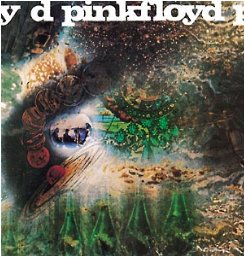 When A Saucerful of Secrets
was released in June, it was the first act from Pink Floyd not lead by Syd
Barrett. However Barrett was still on the album, but this time only credited
for a single track (last on the album) and only played on 3-4 other tracks.
So this really was a test for the band, to see if they could survive without
Barrett, as they so far had almost entirely relied on Barrett's ability to
write songs.
When A Saucerful of Secrets
was released in June, it was the first act from Pink Floyd not lead by Syd
Barrett. However Barrett was still on the album, but this time only credited
for a single track (last on the album) and only played on 3-4 other tracks.
So this really was a test for the band, to see if they could survive without
Barrett, as they so far had almost entirely relied on Barrett's ability to
write songs.
After this album Barrett was no longer a part of Pink Floyd
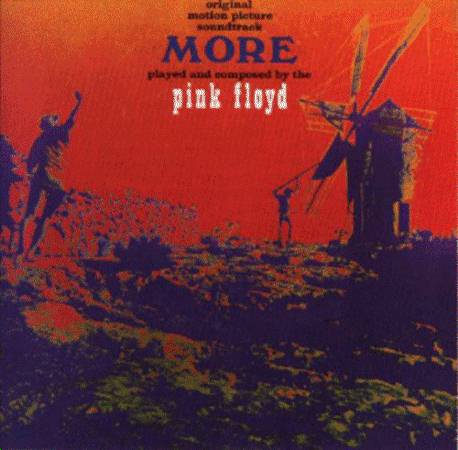 But by the time The Pink Floyd had already made their name on the underground scene,
so Waters, Gilmour, Wright, and Mason went on as Pink Floyd. A few meetings / discussions
were held with Barrett and their former manager by his side, claiming Pink Floyd couldn't go on
without Barrett. In fact the issue was that they couldn't go on with him.
But by the time The Pink Floyd had already made their name on the underground scene,
so Waters, Gilmour, Wright, and Mason went on as Pink Floyd. A few meetings / discussions
were held with Barrett and their former manager by his side, claiming Pink Floyd couldn't go on
without Barrett. In fact the issue was that they couldn't go on with him.
They had been hoping to keep Barrett on as a writer, and then they would perform live,
but Barrett was past even that point.
December 1968 they were approached by a movie director, who was very fascinated by the
Flower-Power generation, and wanted to make a movie about it.
He asked Pink Floyd to
do the music score for the film that was to be called More.
The soundtrack was released July '69.
This was obviously their first film score,
but they had been offered quite a fair sum to the job and they accepted. Bare in
mind that by this time they were far from the famous rock stars we know them
as today. Their name was of course know, but they had a hard time making ends meet
financially, as they in those days would play mostly clubs and scenes like that.
Later on in their career they also scored Zabriskie Point
(1970) and Obscured by Clouds (1972)
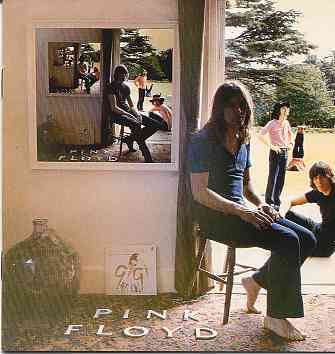 Ummagumma
(October '69) So they had made their name, and were playing clubs and smaller scenes.
Like on this album; Manchester College.
Ummagumma
(October '69) So they had made their name, and were playing clubs and smaller scenes.
Like on this album; Manchester College.
Still very experimental. Many would say they were ahead of their time. What they were
like as a live band, comes out quite clearly on this, their first release of live music.
Jamming and elaborating on the music pieces clearly pushing the barriers of the
well know 3 minutes radio hits. Something they had been using all the time even back
in the Barrett days. Radio hits never had been their strong side.
As it was a double album, there was plenty of room for all four members to try
out a bit of this and that. So the studio part of the double album is in my eyes
still the most experimental part of their entire music catalogue.
 Atom Heart Mother released in June '70.
Atom Heart Mother released in June '70.
Floyd toyed with classic orchestra and choirs. Having little experience with
this matters, they got assistance from a guy called Geesin. This work is found
on one side of the LP, that was just one long track - "The Atom Heart Mother Suite"
The other side was more familiar Pink Floyd tracks.
Greatest problem with this album was the fact, that Pink Floyd went on a tour as they started the orchestra and choir work. Ron Geesin took over and did a very good job indeed. They then had to mix this work with the music already recorded by Floyd. Somehow this never really worked to the four Floyd members' satisfaction. They were always very particular about the sound. It has been said quite often since, that they never felt this album was a success. Not much was later on used on stage nor does it appear on their later "collections" ("Echoes" or "A Foot in the Door")
Still the album is very important in the life of the band - especially as it was their first number one hit. They had reached a new audience or at least a wider audience.
 Meddle The year is now 1971 and
in my opinion, seen in the rear view mirror, this is the album on which Pink
Floyd gets the sound we all love them for. Well that's debatable, but this
is the album leading up to their great commercial success. We are so very
far away from "The Piper..." and "Arnold Layne" but we are getting very close
to their greatest success. Yet we are only 3 years from the break with Barrett.
Meddle The year is now 1971 and
in my opinion, seen in the rear view mirror, this is the album on which Pink
Floyd gets the sound we all love them for. Well that's debatable, but this
is the album leading up to their great commercial success. We are so very
far away from "The Piper..." and "Arnold Layne" but we are getting very close
to their greatest success. Yet we are only 3 years from the break with Barrett.
They had now been in the business long enough to know what they wanted with
music and knew how to get it.
In comparsion to "Atom Heart Mother", as for what was used later on by Pink Floyd,
the track that covers the entire
side 2 of the LP Echoes - one single
track - has been used frequently by Gilmour on his solo tour "On an Island".
It's on both "Echoes" and "A Foot in the Door".
Also the track "One of these
Days" was on their A Delicate Sound of Thunder tour
 Obscured by Clouds. June '72.
Obscured by Clouds. June '72.
Life goes
on and they are asked to make another filmscore. The movie was called "La Vallée"
and the director was the same as "More". In my opinion Pink FLoyd didn't need
this as artist, but they needed the job or rather the money. In my opinion this
music is a bit of a setback and the album never got much attention.
Something good came out of it though. The director starts filming Pink Floyd
Pink Floyd Live at Pompeii.
 The movie was finished September 1972, and I suppose
that it can only interest real Floyd fans. BUT its a statement. They are now
so much more than "underground".
The movie was finished September 1972, and I suppose
that it can only interest real Floyd fans. BUT its a statement. They are now
so much more than "underground".
The movie is a recording of Floyd playing
the ancient roman amphitheatre of Pompeii. Real live music recorded at scene. A
gem for us fans. Oh, and by the way on the setlist is the track "Echoes".
The movie wasn't a real movietheater hit in those days, but so much more interesting
to us fans again, is the DVD released some 20 years later (2003). On this you'll see
footage of the band recording "The Dark Side of the Moon"
This is it!.
March 1973 the album Dark Side of the Moon hits the streets.
An album that is to become
world record breaking. Not just a milestone for Pink Floyd but a record breaker on
the Billboard Top 200 list, as the album on the list for the longest period of time. When
the album went of that list, it was to return after a short while, as it was now
rereleased as a 25 years celebration.
A concept album. What they had been working towards. We started seeing one side of "Atom Heart Mother" as one long track and again on Meddle. Now we have one coherent album. Concept albums became to many fans the trademark of Pink Floyd. A style used for the next 10 years and four albums
By now Pink Floyd had been in the business for nearly 10 years and had been craving
for this success. They developed their music into this and now reaped the harvest
they had sown. No more club scenes but big football stadiums all over the world
- especially North America.
 Where do you go from here? The success
they achieved with "Dark Side" was what they had been working towards for so many years
and now they had reached their goal. Now what? Well they knew the business and
knew they had to go to the studio and work on a new album, but things would never
be the same again.
Where do you go from here? The success
they achieved with "Dark Side" was what they had been working towards for so many years
and now they had reached their goal. Now what? Well they knew the business and
knew they had to go to the studio and work on a new album, but things would never
be the same again.
Wish You where Here was never an
easy album to record. Their enormous success had left them in a limbo, they had to struggle
out of. That's in short what the title "Wish You Were Here" refers to. They were all
four of them mentally somewhere else.
Luckily enough for both the band and for the
world, they were professionals and came up with another success. Maybe not quite such
big a success but still an album that stands out and today remains a classic.
The theme of absence also included the memory of Syd Barrett. They still had
both feet on the ground, and still remembered who they were and where they came from.
Hence the track "Shine on You Crazy Diamond" on that album - the Diamond being Syd.
And we all know the "secret story" of how Barrett turned up in the studio as they were
recording this exact track.
After the huge success with "Dark Side of the Moon" they followed with another
great album "Wish You Were Here", well received by the fans and opening the doors
for new fans as well.
Now followed
Animals.
It was never the same commercial success and the audience had raised
their expectations. I'm not saying this album was no good, cause it certainly is,
but it never was the same hit as the two albums before this. Actually both "Dark
Side of the Moon" and "Animals" reached second place on the UK album charts at the time, and
"Wish You Were Here" reached first place.
So Pink Floyd had got all they wanted?
The audience still flocked to the stadiums to see their shows. But things weren't the
same anymore. We already learned that there were serious problems about "feeling
present" at the recording of "Wish You Were Here"
Waters had by this point established
himself as the writer of both music and lyrics. That was the case with "Dark Side of
the Moon". It was the same
on "Wish You Were Here" and now with "Animals". The band would still all contribute to the
sound and alter the songs so that it ended up as a Pink Floyd track.
It was not just in the studio. To the concerts they would all arrive separately - at least Waters did. There were more and more small hints of the band loosing their feeling as a band. They had gained the success they wanted, but Waters for one felt they had lost the intimacy with their audience they knew so well playing clubs in the days before "Dark Side of the Moon".
And this bring us to the "Spitting incident". Another well known secret.
Touring with
"Animals" - a tour by the way called "In the Flesh" - Waters had had enough. Read it in
Waters own words here)
As we all
know this lead to Waters writing "The Wall" (Well, every fan knew and now you know too)
A Wall between the rockstar and his audience. A wall built up around the rockstar to
protect him from basically everything.
November 1979 was the release date of this grand album.
And it was a grand plan
behind it as well. A double album, a concert with this giant wall, and a movie.
Three things - even better than a Kinder Egg. Some 6-7 years from their commercial
breakthrough with "Dark Side of the Moon", which by the way was still on the American
Billboard 200 chart in that year. In time it would turn out that "The Wall" became an even greater
success in Europe than "Dark Side of the Moon".
"Dark Side of the Moon" had the theme of Life and insanity - basically. "Wish You Were Here" was about absence or maybe alienation. This time the story was about the life of a rockstar. It's often been claimed that it was in fact autobiographical. Obviously there are many parallels to Waters life here, but many things are also based on colleges from the business through the years. Also the sad story of Barrett has influenced the story.
A success it was. In the late 60'ties the wrote music for movies. In the early 70'ties they were stars in their film with live music. Now in the beginning of the 80'ties they wrote their own movie and made all the music. They had a great well esteemed director to make the movie too. Huge successes both the album, the concerts, and the movie.
The story about this rockstar building up a wall around himself. Far fetched? Not
at all. Many years later Waters would refer to himself as "this poor miserable
fucked up little Roger" (Quote from his "The Wall Live" released in 2015).
The album was written by Waters and presented as a demo to the band. It needed
a lot of work of course to become a real Pink Floyd album. David Gilmour contributed
to the album with 2-3 tracks - most famously "Comfortably Numb" - and I recon Mason
did his usual building bridges, engineering and stuff. But apparently Wright didn't
add enough at least to Waters liking. So he was kicked out of the band. Technically he was
bought out of the band, as the "Band" consisted of a company called Rule Britannia,
that owned every thing from amplifiers to inflatable pigs. Waters bought Wright's part,
but the fact remains that Waters didn't want Wright there anymore and so Wright left
the band. On most covers of the album his name isn't even there. For the
concerts Wright was hired as a session musician.
This sounds to me like a band
falling apart.
None the less this is still my favourite album and I can still experience "that great thrill of confusion" listening to that album. Did I ever tell you about my bedroom wall from my younger days?

"What have we here laddy ?
Mysterious scribblings ? Secret codes ? No ! Poems no less. Poems everybody. The
laddy here makes himself a poet"
Yeah ,some of us do consider him a poet.
 Now where do we go from here? The disintegration of a band. Wright had been kicked out
and the climate in the band was not the best - and certainly far from what they knew in
the 60'ties.
Now where do we go from here? The disintegration of a band. Wright had been kicked out
and the climate in the band was not the best - and certainly far from what they knew in
the 60'ties.
Today's menu was leftovers. At least that's how
"The Final Cut" started
out. "Spare Bricks" was the working title. All the songs that never made it to the
original double album were now meant to become an album.
The title "The Final Cut"
can be interpreted in different ways. None of them optimistic however. It's a term
from the film industry meaning the final edition of a film, when all is edited and cut.
In the title track of the album we're talking the final cut as holding a empty blade
in the hands preparing to make the final cut - gloomy. But another interpretation is
that this is the last press of any Pink Floyd album (This was the time of Vinyl albums
remember) All three version meaning the end.
The Album didn't quite end as only leftovers from "The Wall". The Falklands war changed this to some extend. New material was added. So eventually it evolved into the first in a series of anti-war-albums mastered by Waters. And no doubt, this is a Waters album - dedicated to his late father Eric Fletcher Waters. The last Pink Floyd album
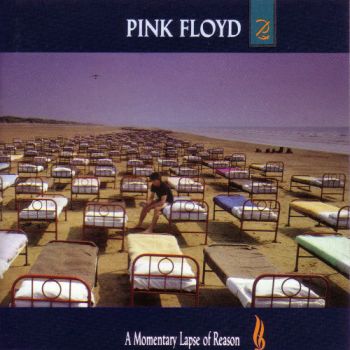 Well the last Pink Floyd album if it was up to Waters that is.
Well the last Pink Floyd album if it was up to Waters that is.
Some time was to pass
- 6 years - before Gilmour and Mason started stirring the pot.
It seems Waters
was convinced that he had kicked the three others out of Pink Floyd, but as it turned
out it was the other way around, and Waters found himself outside the band.
Gilmour and Mason had started working on material for a new Pink Floyd album.
Wright was not in the band, as Waters had bought him out back then, but Gilmour
and Mason invited Wright in as a musician.
Waters pulled out the heavy artillery
of lawyers and books, as he was very well aware of the value of the name and brand "Pink
Floyd".
Cry as he might, Waters lost the battle and Pink Floyd went on as a band
now with Gilmour as the leading figure.
A momentary Lapse of Reason 1987
As a new approach by Pink Floyd MTV was used to promote the coming
album. The video "Learning to Fly" was on heavy rotation, and a competition
in which the winner would get backstage with Pink Floyd was set a foot.
Guess who won...
The big issue now was, who was now to do the writing. Barrett did in the beginning and
gradually Waters ended up taking that part almost completely. Now with no Barrett and
no Waters and with Wright and Gilmour as only supporting writers, this was quite
a challenge. Gilmour took on the assignment with the help from a few friends.
It was debated back then, and will be for ever more, if this was still "the Real
Pink Floyd", but the fact remains that the album was a huge success. Obviously some fans
were lost along the way, as it happened when Barrett left the band, but the album
was follow up by an unceasing world tour. They performed to millions and the tour
was extended all the time, with both performance at Venice Italy and Le Château de
Versailles in France.
So with nor Barrett or Waters the band went on with a roaring
success and gained new fans every day.
Let's pause for a short while at this point in history, and remember who it was that
started Pink Floyd and who was the latest arriving band member.
20 years is long time.
 So we' established
that these are new times for Pink Floyd. Something else new is the release of live
albums. Not counting bootlegs, we only saw one other live release and that was some
twenty years ago with Ummagumma
So we' established
that these are new times for Pink Floyd. Something else new is the release of live
albums. Not counting bootlegs, we only saw one other live release and that was some
twenty years ago with Ummagumma
A Delicate Sound of Thunder was
released in 1988
Obviously their huge success they lived through now, was firmly
based on their vast back catalogue filled with heavenly music. For this tour they did
certainly not only play tracks from "A Momentary Lapse of Reason", but in particular
tracks from "Dark Side of the Moon" were played. Quite boldly in my opinion they also
used the track "One of These Days" from Meddle
and that with great success might I add.
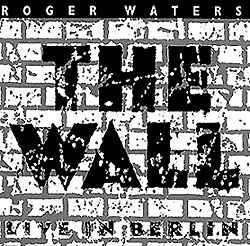 Around 1989 political forces rocked the music world. The fall of the Berlin Wall brought
on the idea of performing "The Wall" in Berlin, to celebrate the reunion of East
and West Germany
Around 1989 political forces rocked the music world. The fall of the Berlin Wall brought
on the idea of performing "The Wall" in Berlin, to celebrate the reunion of East
and West Germany
So people from all over Europe - and the world for that matter -
decided to go to Berlin to see Pink Floyd The Wall.
Only they must have been very disappointed. There were great international stars
present. To name a few: Sinéad O'Connor, Bryan Adams, Cindy Lauper, Van Morrison, Scorpions, and
Roger Waters... but wait a minute here. How about David Gilmour? Nick Mason?
Richard Wright? No. They weren't there, cause this was NOT a Pink Floyd concert.
This was Waters trying to tell the world that HE was Pink Floyd, and to quite a
few people he managed to do so, in the sense that they thought the were at a
Pink Floyd show. Ever since Waters parted with Pink Floyd, he had tried
to convince the world that he was as good as the others, but his struggle never
caught on. People that had attended this concert on August 25. 1990 still to this day
think the attended a Pink Floyd concert.
Mind you, Roger Waters released some really
great music even without the help of the rest of the band.
To all real Pink Floyd fans, it was well know that Waters and Gilmour were not on best terms. To quote Waters taken from a public statement around 2010:
"...with Us having been so famously at each other's throats for years and years..."
 As for the real Pink Floyd? Well, why get of when you are riding on the biggest
wave? I should think not! So still with captain Gilmour on the bridge they emerged
on a new album project. And this time Wright was
back in full force. Waters had given up the fight with his former band mates and
settled an agreement. I'm not going to get in to the details of this deal, but just
say that it included which song they could use, wich not to play, and, well stuff
about the balls on the inflatable pig!
As for the real Pink Floyd? Well, why get of when you are riding on the biggest
wave? I should think not! So still with captain Gilmour on the bridge they emerged
on a new album project. And this time Wright was
back in full force. Waters had given up the fight with his former band mates and
settled an agreement. I'm not going to get in to the details of this deal, but just
say that it included which song they could use, wich not to play, and, well stuff
about the balls on the inflatable pig!
The Division Bell
1994 Again Gilmour took the lead with a bit composing
assistance from friends and colleges and even his new wife helped writing lyrics.
Listening to this new album, is quite easy to me to tell that Wright is back from
the beginning of this album. Wright always had a more psychedelic approach to the music,
and let's face it, most of the Pink Floyd sound comes in the studio - not so much
in the writing of the tracks. That's the way it has been since 1967 - 1968.
This album too was lightyears away from the Waters concept albums, but it is still a success and was well received with both the newly gained fans and those that stuck after the release of "A Momentary Lapse of Reason". Pink Floyd had always tried new roads and that's what the fans expected. No two albums are alike.

![]() Also a new world tour with just the same success. Young and old fans loved the band.
Also a new world tour with just the same success. Young and old fans loved the band.
To please their audience, and maybe to some extend because it's technical easier these
days, this tour also gave birth to a livealbum. To prove they never forgot their roots
you could on this album find "Astronomy Domine" from the Pink Floyd's youth.
(The Piper at the Gates of Dawn, 1967)
Other than that, these two latest live albums are quite similar, considering that their
backcatalogue hadn't evolved all that much since the release of "A Delicate Sound of Thunder"
I'm still glad they did release this album, cause we all know the most famous
track of Pink Floyd, has on numerous occasions been voted "Comfortably Numb", and
this particular live version Gilmour just goes on and on with his guitar. I still remember
that night in "Parken" in Copenhagen August 25. 1994 - man, that was some divine guitar
playing.
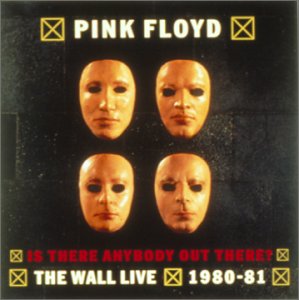 None of us get any younger. Nor did the members of Pink Floyd. If it was an agreement or
just the way things turned out, they slowed down. The band wasn't officially dissolved
but it wasn't active either.
None of us get any younger. Nor did the members of Pink Floyd. If it was an agreement or
just the way things turned out, they slowed down. The band wasn't officially dissolved
but it wasn't active either.
The record company went on with business as usual,
but that would be with the release of "Rereleases", "Collections", and unreleased old
material.
I'm not saying that it's all bad. Take "Is there Any Body Out There"
that was a long long overdue release. Should have been released in the 80'ties.
The fans were hoping for new songs, but for that they would have to turn to the
solo projects. Especially Waters was active, but also Gilmour and Wright were to
release albums of their own. Pink Floyd was history.
Echoes, The "Shine On box", "Dark Side of the Moon - SACD" "Dark Side of the Moon - DVD" "Piper at the Gates of Dawn - 40 Years Anniversary" " A Foot in the Door" "London 1966/1967" "The Discovery Box set" "The Wall - immersion box" and I could go on and on and..
But was this really to be the end of Pink Floyd? No new material? Ever?

In 2005 Sir Bob Geldof felt like rounding up a new Live Aid concert. To be called
"Live 8". I can't say if Bob Geldof is a genius with a magic touch of persuasion
or if both Gilmour and Waters were just "ripe" at the time, he managed to talk them
into making this benefit concert as Pink Floyd. The Pink Floyd fans were thrilled. Well
not just us, but with all the big names participating in this world live event, all
everybody talked about was Pink Floyd.
The four of them! The first concert since
The Wall 1981 with Pink Floyd as we knew them in their glory days.
 Live 8 - no doubt - they had not yet retired
Live 8 - no doubt - they had not yet retired
This was everything it should be. Not more than 4-6 tracks but top quality. This was Pink Floyd at their best. I'm sure I wasn't the only one, that forgot that this concert was in benefit for the poor and unfed all over the world.
"It's actually quite emotional, standing up here with these three guys after all these years. Standing to be counted with the rest of you. Anyway, we're doing this for everyone who's not here, particularly, of course for Syd."
Waters was also quoted for saying that he'd roll over and do just anything to make
this concert work, and for that night leave the past behind.
I myself feel
quite convinced that although there has been some fights in the band, they all
were able to remember the good times they had spent so many years ago in St. Tropez with
the four of them and all their families. Stuff like that runs deep.
Years later
video footage of Waters and Gilmour running into each other, and NOT tearing at
each others throats. Much later they would appear on other charity shows together
After this event, we were all holding our breaths, in hope that this would not be the final verse from Pink Floyd. But all hope was lost the day the world got the sad news of Rick Wright's death. Now the real Pink Floyd will never be able to gather again.
 Yes. Tragically Richard Wright passed away in 2008. Not to mention the great loss
that was in it self, this also put an end to all the dreams and hopes, that always
would be there, that someday we'd see another reunion.
Yes. Tragically Richard Wright passed away in 2008. Not to mention the great loss
that was in it self, this also put an end to all the dreams and hopes, that always
would be there, that someday we'd see another reunion.
Fortunately there are still 3 wide awake members, that are all active in their
own ways
And we all believed that this was the end of anything labelled "Pink Floyd"
We were all to be proven wrong.
Some 20 years after the release of their last album The Division Bell, they did release a brand new album. "The Endless River"
The popularity of Pink Floyd was still unquestionable. This album was record breaking
as the most preordered album on Amazon in 2014 and later it turned out to be the
most preordered album of all time.
It was created with the leftovers from "Division
Bell" and there were recordings of Wright's music from that time. Let's face it:
How ever hyped the album was, and no matter how much it sold, no one talked
about the album two days after it's release. Pink Floyd as we knew it is in the past.
We can still get some real great music from them. Waters toured with "The Wall" years
on end. Gilmour joined him on one concert to play "Comfortably Numb", and Gilmour has
released an album in 2015 and followed it by a tour, but "Pink Floyd" is no longer.












